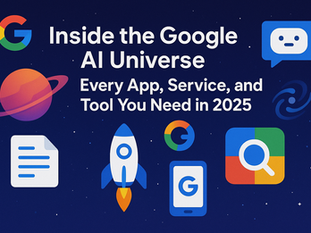
Smart Tech, Stupid Tired: How Our Gadgets Are Quietly Burning Us Out
2
24
0
We were promised efficiency, freedom, and a better quality of life. But in 2025, the digital world that was supposed to simplify everything is starting to wear us down. From AI assistants that never sleep to productivity tools that demand constant tracking, our smart tech is making us smarter, but also more exhausted.
Welcome to the age of digital burnout, where managing your life with smart gadgets might actually be ruining it.

📱 The Tech That’s Supposed to Help; and Why It Doesn’t
We’ve filled our lives with tools that were meant to give us time back:
Smartwatches that monitor sleep and heart rate
AI calendars that optimise your every hour
Voice assistants that handle emails and reminders
Wearables that nudge you to stand, walk, breathe
So why do we feel more overwhelmed than ever?
Because these tools, while helpful, often add more micro-decisions, more notifications, and a sense of being always on. In trying to optimise every minute, we're inadvertently turning ourselves into productivity machines.
🧠 The Psychology of Constant Digital Input
Digital burnout isn’t just about screen time, it's about mental load. Every notification, reminder, or prompt from your smart device demands a little sliver of your attention.
According to a 2024 study by the Digital Wellness Institute, individuals who use 4+ productivity apps daily reported 30% higher levels of cognitive fatigue and 20% lower satisfaction with their tech usage.
Smart doesn’t always mean simple. In fact, the smarter the tech, the more we feel the pressure to live up to its pace.
🚨 Signs You Might Be Experiencing Smart Tech Fatigue
You could be in the middle of digital burnout if:
You feel anxious or annoyed when your phone buzzes
You’re always “busy” but can’t pinpoint what you’ve accomplished
You have sleep issues due to constant device use
You find it hard to focus without background noise or multitasking
You feel guilty for not hitting daily fitness or productivity goals set by your device
These are not personal failings, they’re symptoms of a tech system that values output over wellbeing.
🔄 Productivity Apps: The New Pressure Cooker
Apps like Notion, Todoist, and even AI-enhanced platforms like Google’s Gemini and Microsoft Copilot promise to manage your time better. But they often come with a catch: they gamify productivity, turning your day into a performance review.
When every task has a checkbox and every moment has a metric, it's easy to feel like you're never doing enough, even when you’re doing too much.
🧘 How to Fight Back Against Tech-Driven Burnout
You don’t need to go off-grid. But you do need to create smarter boundaries. Here are a few digital wellness strategies that work:
✅ Set app time limits on social media and productivity apps
✅ Use Focus Modes on devices to reduce irrelevant pings
✅ Un-sync your smartwatch for at least part of the day
✅ Schedule offline blocks just like meetings
✅ Declutter your tech stack - do you really need five productivity apps?
Bonus tip: Try a “digital Sabbath”; one day a week with no screens (or just one screen). Many top performers and creatives swear by it.
🌍 A Broader Cultural Shift: From Hyper-Productivity to Mindful Tech
In the 2020s, “hustle culture” dominated the tech scene. But 2025 is ushering in something new: tech minimalism.
People are beginning to ask: Is this tool really making my life better, or just busier?
From Silicon Valley to wellness influencers, there’s growing momentum behind intentional tech use - choosing fewer, better tools and giving your brain room to breathe.
📣 Final Thoughts
Smart technology isn’t evil. But when our devices control our time, attention, and even our sense of worth, it’s time to pause and reevaluate.
The real promise of technology was to free us. Let’s start holding it to that promise—by being more mindful, more human, and maybe just a little less connected.
Have you experienced tech burnout? What tools help you find balance? Drop your thoughts in the comments or tag us on Instagram @JoeBlogsOnline using #TechWithoutBurnout







